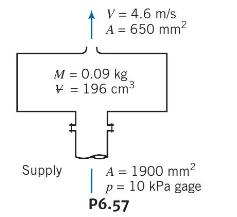A spray system is shown in the diagram. Water is supplied at (p=10 mathrm{kPa}) gage, through the
Question:
A spray system is shown in the diagram. Water is supplied at \(p=10 \mathrm{kPa}\) gage, through the flanged opening of area \(A=1900 \mathrm{~mm}^{2}\). The water leaves in a steady free jet at atmospheric pressure. The jet area and speed are \(A=650 \mathrm{~mm}^{2}\) and \(V=4.6 \mathrm{~m} / \mathrm{s}\). The mass of the spray system is \(0.09 \mathrm{~kg}\) and it contains \(\mathrm{V}=196 \mathrm{~cm}^{3}\) of water.

An object, with a flat horizontal lower surface, moves downward into the jet of the spray system with speed \(U=5 \mathrm{ft} / \mathrm{s}\). Determine the minimum supply pressure needed to produce the jet leaving the spray system at \(V=15 \mathrm{ft} / \mathrm{s}\). Calculate the maximum pressure exerted by the liquid jet on the flat object at the instant when the object is \(h=1.5 \mathrm{ft}\) above the jet exit. Estimate the force of the water jet on the flat object.
Step by Step Answer:

Fox And McDonald's Introduction To Fluid Mechanics
ISBN: 9781118912652
9th Edition
Authors: Philip J. Pritchard, John W. Mitchell





